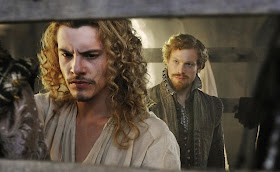Book review of Richard Paul Roe, The Shakespeare Guide to Italy: Retracing the Bard's Unknown Travels (Harper Perennial, Nov. 2011)
by John Christian Plummer
Imagine that you lived in a time in which every educated person was absolutely certain that the planets Mars, Jupiter and Saturn moved both forward and backward. This is what the astronomer Tycho Brahe called “retrograde motion.” In Hamlet, when Claudius tells Prince Hamlet that a return to Wittenberg (the alma mater of Brahe) “is most retrograde to (the King’s) desire.”
From the standpoint of the 21st century, it requires a powerful feat of imagination to reckon that a vast celestial body like Mars would stop in the middle of space and reverse its direction. And that it would do so consistently. But that is precisely what many well educated 16th century Europeans thought happened, and they didn’t just make this up out of a desire for imaginative tales; they had a problem that needed explaining. The problem was Mars appeared at one point in the east of the sky, progressed westward, but then appeared back east of its westward position. If Mars were to move in that way as it orbited the earth…well…one logical explanation would suggest it wasn’t orbiting the earth. But that was impossible, of course, because Mars, Jupiter, Saturn and all the other planets, as well as the sun, absolutely did orbit the earth, because the earth, as everyone knew, was the center of the universe. So given that unassailable fact, Brahe proposed his theory of retrograde motion. Mars, like a crab, like Hamlet, moved backward.
From where we sit in the age of Einstein, it’s easy to chuckle at this absurd mental contortion which, we now know, flies in the face of not only the correct, heliocentric model of the solar system, but also basic Newtonian physics. But let us not forget that the educated Europeans of the 16th century were operating from a working hypothesis – the geocentric model of the universe – that was powerful enough to put mortal fears into the minds of men like Copernicus and Galileo, whose more elegant, thoroughly researched and ultimately accurate explanations eventually won the day.
It is no hyperbole to call Richard Paul Roe a twenty-first century Galileo of literature. Roe isn’t examining the stars without, but rather the stars within: specifically a third of the canon of the man some call the greatest author who ever set pen to paper, the man we call William Shakespeare. The so-called Italy plays of Shakespeare are the subject of Roe’s tremendous inquiry, and his more than two decades of painstaking investigation and research have resulted in the landmark book, The Shakespeare Guide to Italy, Retracing the Bard’s Unknown Travels, just released, posthumously, under the Harper/Perennial imprint.



































